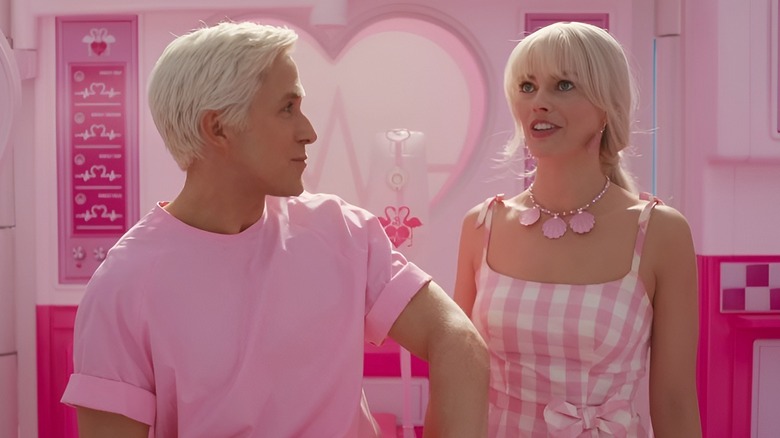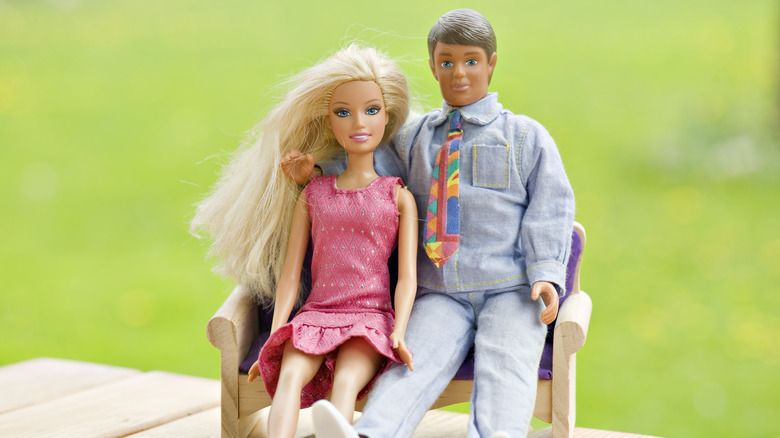Why Barbie And Ken's Namesakes Make Their Relationship A Little Awkward
For over six decades, few toy couples have matched the iconography of Barbie and Ken, as the monumental success of Greta Gerwig's "Barbie" has proven. But while their life in plastic has birthed one of the most beloved fictional pairings out there, the origin behind their names might make their relationship a little less fantastic.
Ruth Handler released the Barbie doll in 1959. Following the doll's runaway success, Ken was created in 1961 after customers began to demand a mate for Barbie. Although the playthings were always intended to be a romantic pair, the individuals who inspired their names shared a very different relationship. Both Barbie and Ken were named after Handler's children, Barbara and Kenneth respectively. You read that right — the namesake of the world's most well-known plastic partners were brother and sister in real life.
As meta and self-aware as Gerwig's "Barbie" got, it's surprising that the film's creative team didn't include this factoid, which would have drawn a quirky connection between "Barbie" and "Star Wars." Who knew that Barbie and Ken shared so much in common with Luke Skywalker (Mark Hamill) and Princess Leia Organa (Carrie Fisher), who were initially unaware that they were siblings?
Ultimately, it's nothing worth getting too squeamish about. At the end of the day, the only thing Barbie and Ken share with Handler's kids are their names alone and neither character was intended or should be seen as a definite representation of the sibling relationship. If this connection still makes you feel weird, however, you can stay rest assured that Barbie and Ken's bond will only go so far.
Barbie's purpose means she will never have kids with Ken
The image of Barbie has transformed over the decades, which Greta Gerwig's "Barbie" both celebrates and critiques. But throughout her evolution, Barbie and Ken have never gone beyond being boyfriend and girlfriend, with Ken being more of an accessory to Barbie than anything. And it's likely that their relationship will stay this way so long as Ruth Handler's vision for the iconic doll stays intact.
Handler might have been a mother who embodied all that women were capable of achieving, but the demand her work required took a toll on her family time. In a BBC interview, Handler commented, "I felt tremendous guilt about being a mother away from my children, because in those days, there were no career women. Other women didn't know quite how to treat me." In this regard, Handler chose not to have Barbie and Ken marry or give them children, even after increased demand from the public. To Handler, the idea would have reinforced the traditional path that society expected for women, especially at that time.
Later years would prove this notion to be the right one. In 1991, Midge, one of Barbie's lesser-known friends introduced in 1963, got married to the similarly obscure Allan. Midge also had a three-year-old son named Ryan and was pregnant with another child. This "Happy Family" set was created with good intentions, but quickly garnered complaints from customers and was pulled from Wal-Mart shelves in 2002. Emerald Fennell plays pregnant Midge in "Barbie," and the film even alludes to her controversial past. Whichever way folks see Barbie and Ken's connection, it has done little to halt the movie's box-office domination.
In the Barbie movie, there's no romance between Ken and Barbie at all
Honestly, fans can relax about this weird, potentially incestuous situation; in Greta Gerwig's "Barbie" movie, Barbie, played by Margot Robbie, couldn't possibly be less attracted to Ryan Gosling's Ken. (Yeah, we know; it seems impossible to not be attracted to Ryan Gosling in literally any situation, but here we are.) As Helen Mirren's narrator puts it. "Barbie has a good day every day... and Ken only has a good day if Barbie looks at him."
Ken is quite clearly desperate for Barbie's affection, and she's not exactly effusive about Ken in return. After her choreographed dance party — where she finds herself thinking about dying all of a sudden — Barbie has to thwart Ken's advances for what is probably the millionth time when he asks if he can "stay over" because they're "boyfriend-girlfriend." He can't, though; as Barbie tells him, she doesn't want him around, and besides, it's girls' night at Barbie's dream house, not "Ken's dream house."
This attitude majorly backfires on Barbie after Ken figures out how to bring the patriarchy to Barbie Land, but after she and the other Barbies set it right, she still has to admit to a crowd that she's simply not in love with Ken and needs to go off and become her own woman (literally, as she becomes a human). In any case, Barbie and Ken in Gerwig's movie definitely aren't an item, so you don't have to think about their namesakes too much while watching it.
"Barbie" is in theaters now.


